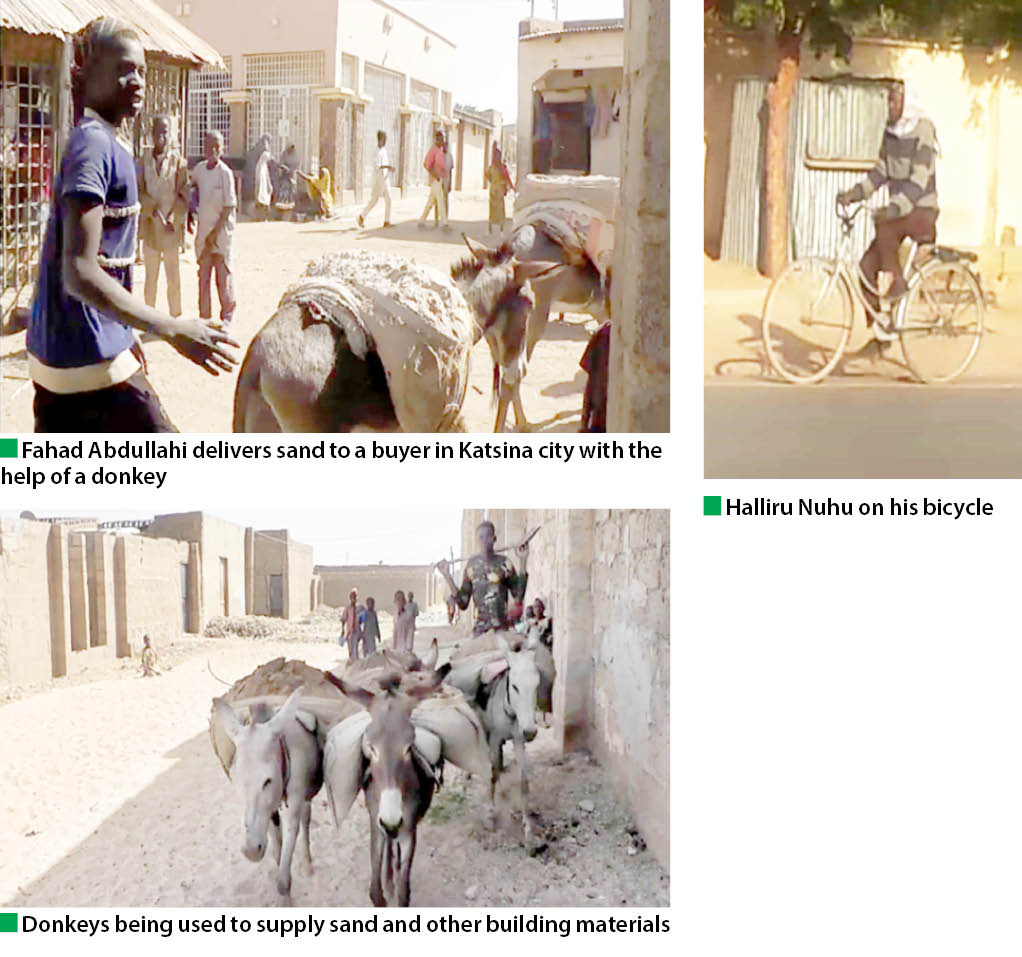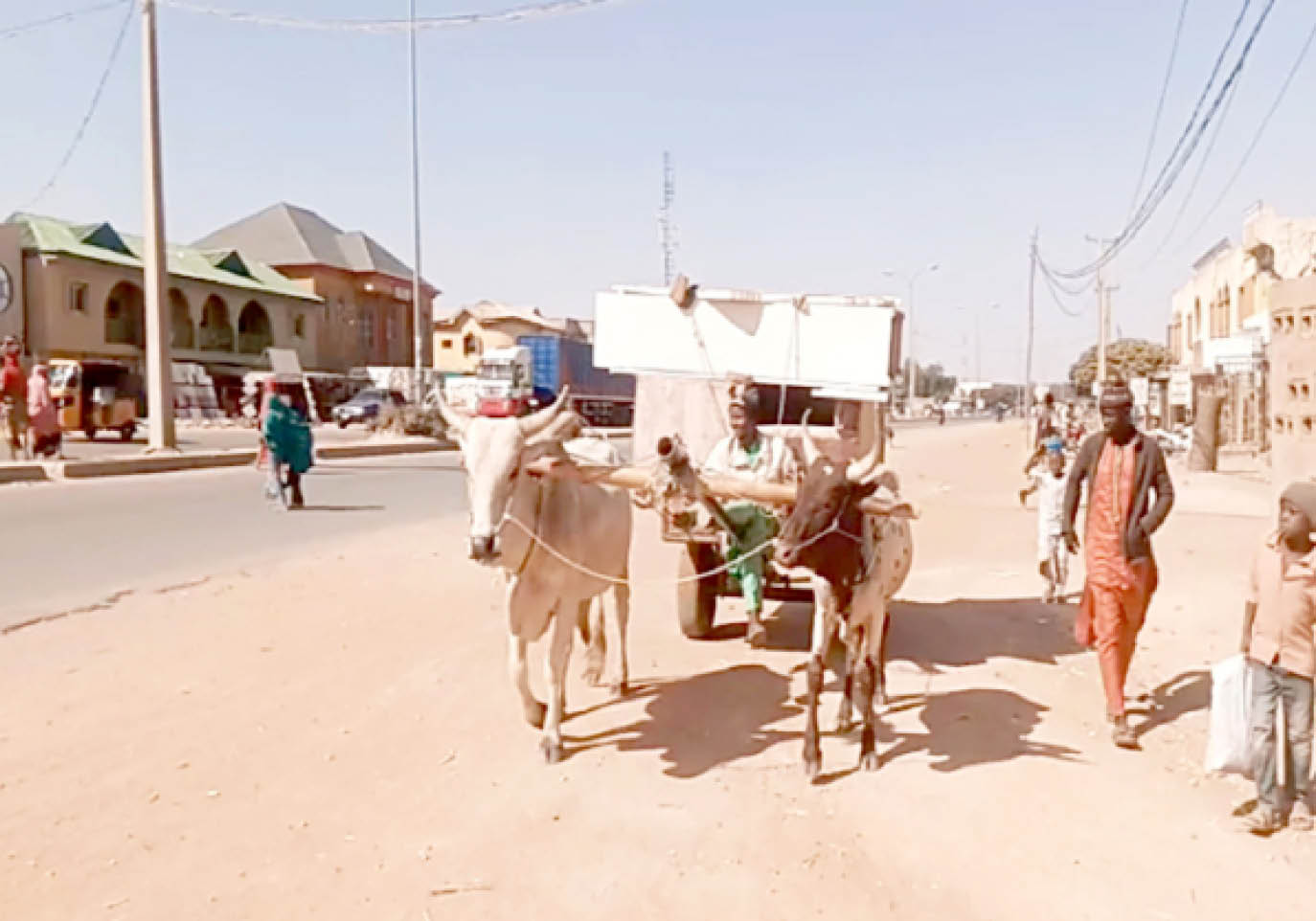Amidst rising economic costs, occasioned by fuel subsidy removal, Katsina residents are resorting to ancient ways of transporting goods and services.
The residents, who are mostly low-income earners, made the swift decisions in order reduce the burden and pressures of rising living costs to navigate through the tough period of economic uncertainties.
Many Katsina residents now use ox-driven carts to transport goods from one destination to another because of the high cost of transportation that is hinged on high cost of fuel.
Oxcart is now commonly used to convey bride’s furniture (Kayan Daki) to the matrimonial home in the city because hiring a truck or van is expensive though faster, says Nuraddeen Isma’il who drives the oxcart.
- Silent crisis: Exposing gender-based violence among internally-displaced women and girls
- How has the anti-graft war shaped two generations? (2)
“People just want to cut costs and reduce the burden of engaging vans in conveying furniture to the bride’s matrimonial home.
“When there are mass weddings, we make about N20,000 or N30,000 daily by charging N7,000 or N10,000 per trip, to transport a bride’s furniture, depending on the location and the capability of the person involved or the owner.
“Many low-income earners now look up to us to transport their goods and services to different locations across Katsina city because they don’t have the money to fuel their vehicles or hire vans to do the job for them,” Ismail said.

Since the fuel subsidy removal by President Bola Ahmed Tinubu in May last year, business is no longer as usual for many Katsina residents hence the decision to devise ways of coping with the situation.
Similarly, people like Fahad Abdullahi use his donkeys to deliver sand and other building materials like cements and blocks to building sites in Katsina for a fee.
Some low-income earners, who cannot afford hiring tippers who largely charge high amounts of money since the fuel subsidy removal, employ the services of donkey owners like Abdullahi.
“This is an opportunity for us as we now make money daily from this business which before now was on the verge of going extinct.
“Before now, we delivered each sack of sand at the rate of N50 but today, we charge as high as N200 and I can make 50 trips in a day using my six donkeys. So, we’ve taken advantage of the fuel subsidy removal to make a living and that is life for you.
“We suffered a lot in the past when majority of people here use vans or tippers to deliver sand and other building materials, I hardly make N1000 in a day but that tough time is gone,” said Abdullahi.
Following the removal of fuel subsidy, which resulted in hike in transportation fares, the price of donkeys in the market have also gone up according to Fahad Abdullahi. He however called on President Bola Tinubu to initiate programs that would ameliorate the sufferings Nigerians are facing daily.
In the meantime, some civil servants in Katsina like Halliru Nuhu and Habibu Musa who were using motorcycles to go to their places of work have abandoned them and are now using bicycles because they cannot afford to buy fuel.
“From my house to my place of work is about 12 kilometres and I spend a minimum of N1000 to fuel my motorcycle everyday to get there and come back. Where would I get the money to sustain that when nothing has been added to my monthly salary at the moment? Even the palliative the government has been making noise about, we have not seen anything up till now.
“I want you to tell the world that low-income earners who constitute the majority of our population in Nigeria are suffering and going through a lot,” Halliru Nuhu lamented.
Public commentators in Katsina like Dr Bashir Usman Ruwan Godiya believe that the harsh economic situation in the country requires concerted efforts by the government to address the problems.
“Every sector in the Nigerian economy has degenerated and the consequences are biting hard while the suffering is getting worse by the day. Look, for instance, at artisans and small-scale businesses everywhere, a greater percentage of them have either collapsed or are struggling to survive with many people made redundant with no means of livelihood.
“The situation at the moment is pathetic, subjecting people to untold hardship, hunger everywhere, the rising living cost is unbearable, exposing many vulnerable people to difficulty,” Ruwan Godiya said.
He said the earlier the government and other stakeholders do something to tackle the situation, the better for Nigeria as a country.
Many Nigerians have devised alternative means of coping with the situation, even as the National Bureau of Statistics put the latest inflation figure at 28.92 percent.
While some struggle to get food to eat just to keep body and soul together, others resort to use of alternative means of transportation in order to save money for other critical needs like school fees, shelter, basic health care, among other pressing needs.

 Join Daily Trust WhatsApp Community For Quick Access To News and Happenings Around You.
Join Daily Trust WhatsApp Community For Quick Access To News and Happenings Around You.

